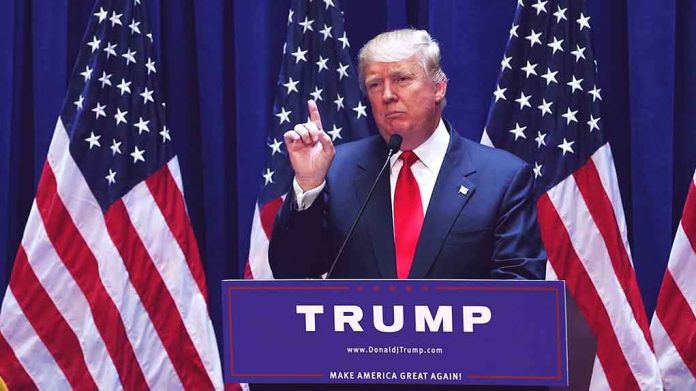
In what can only be seen as a win for former President Donald Trump, the sentencing date for the New York hush money trial has been moved from July 11th to at least September 18, 2024. The wheels of justice appear to grind rather slowly, and the political theatre wages on.
Why the delay? The recent SCOTUS ruling extending presumptive immunity to presidents for their official acts may have just changed the landscape of the case. Trump’s legal team jumped on the opportunity, despite the fact that much of the case happened before Trump became president. Pretty bold move, if you ask us.
Let’s recap for those who’ve been living under a rock or, perhaps more enviably, on a tropical island far from the reach of cable news. Trump was found guilty on 34 felony counts of falsifying business records. The charges stem from payments made to a certain adult film actress during his 2016 presidential campaign. It’s a tale as old as time: boy meets girl, boy becomes president, boy’s lawyer pays girl to keep quiet about their alleged affair. Shakespeare couldn’t have written it better.
Now, you might be wondering how a case about hush money payments made before Trump took office could possibly be affected by a ruling about presidential immunity. Well, dear reader, welcome to the wonderful world of legal gymnastics. Trump’s attorneys argue that prosecutors shouldn’t have presented evidence related to his official actions while in office during the trial. It’s a bit like complaining that the referee looked at your entire soccer game performance instead of just the first half.
Manhattan District Attorney Alvin Bragg’s office, while maintaining that Trump’s arguments are about as solid as a sandcastle at high tide, has agreed to the delay. They’ve proposed a deadline of July 24 for responding to the defense’s motion. One can almost picture the prosecutors sighing heavily as they reach for yet another cup of coffee, preparing for another round of legal whack-a-mole.
The judge overseeing the case, Justice Juan Merchan, seems to have the patience of a saint. He’s rescheduled the sentencing for September 18, “if such is still necessary.” One can almost hear the weariness in his written statement. Perhaps he’s hoping that by September, we’ll all have collectively decided to focus on something else, like the critical shortage of avocado toast or the latest TikTok dance craze.
But let’s not forget the bigger picture here. This is more than just another chapter in the never-ending Trump legal drama. It’s a test of our justice system, a reflection of our political divide, and a reminder that the line between the ridiculous and the sublime is often thinner than we’d like to admit.
On one side, we have those who see this as yet another witch hunt, a desperate attempt by Trump’s political opponents to keep him out of the White House. On the other, we have those who believe this is long-overdue accountability for a man who has danced on the edge of legality for decades. And in the middle? Well, in the middle we have a lot of very confused citizens wondering if this is real life or just a very long episode of “Veep.”
The implications of this case, and the Supreme Court’s ruling on presidential immunity, stretch far beyond Trump himself. We’re in uncharted territory here, folks. The question of how much legal protection a president should have for actions taken while in office is a thorny one. Push too far in one direction, and you risk creating an imperial presidency immune from consequences. Lean too far the other way, and you might paralyze the executive branch with the fear of future prosecution.
As we wait for September 18 (or whenever this legal merry-go-round decides to stop), it’s worth considering what all of this means for the future of American politics. Are we setting precedents that will come back to haunt us? Or are we finally drawing lines that should have been drawn long ago?
One thing’s for certain: this isn’t the last we’ll hear of this case, or of Trump’s legal troubles in general. As the 2024 election looms ever closer, the intersection of law and politics is becoming increasingly crowded and chaotic. It’s like a traffic jam where everyone’s honking their horn and no one’s going anywhere.
So buckle up, dear readers. Whether you see Trump as a political martyr or a long-overdue defendant, this ride is far from over. And who knows? By the time September rolls around, we might all be experts in constitutional law. Or we might have collectively lost our minds. Either way, it’s sure to be entertaining.
In the meantime, perhaps we should all take a page from Justice Merchan’s book and cultivate some patience. After all, in the grand scheme of things, a few more months is just a drop in the bucket. And who knows? By September, we might have a whole new scandal to obsess over. In the world of politics, especially Trump-era politics, tomorrow’s headline is just a tweet away.
Gentle reminder for those who just haven’t been paying attention (or simply don’t care). The “hush money” case was actually a financial fraud case. It wasn’t about paying Stormy off — it was about the steps taken after the fact to cover up the payments. And therein lies the problem.
So what did you think of the outcome? Do you think Trump was guilty? Do you think he can claim any sort of immunity for something that happened before he was President? Could anything he did after be considered something done in official presidential capacity? Send us an email and sound off. We absolutely want to know what you think.
Reactions from Around the Web:
Not everyone is happy with the length of the delay, or the reason for it:
BREAKING: Trump NYC criminal sentencing DELAYED to September 18.
Absolutely disgusting. It does NOT take TWO MONTHS to rule Trump's immunity doesn't apply here since most of the events occurred before he was president and were NOT "official acts."
STOP IT – TRUMP IS NOT A KING.
— Tristan Snell (@TristanSnell) July 2, 2024
Brian Krassenstein certainly doesn’t see any of this as falling under an official act of the president:
“The Manhattan DA's Office has agreed with Trump's request to postpone his criminal sentencing so that Judge Merchan can weigh whether the Supreme Court immunity ruling might impact his conviction."
If you think that a judge will see Trump paying off an adult entertainer, who he… pic.twitter.com/AejZGKgT23
— Brian Krassenstein (@krassenstein) July 2, 2024
Paul Ingrassia sees this as a win for Trump:
BREAKING: President Trump just received his sentencing from Alvin Bragg.
Here’s what he got: 4 years at 1600 Pennsylvania Avenue.
— Paul Ingrassia (@PaulIngrassia) July 2, 2024
And Johnny Maga sees this as a win because, no matter what, sentencing doesn’t come before the RNC:
Trump's sentencing is no longer coming before the RNC
The man just doesn't stop winning pic.twitter.com/pKAKdqEpPG
— johnny maga (@_johnnymaga) July 2, 2024
Quote of the Day:
“Presidents come and go, but the Supreme Court goes on forever.” ~William Howard Taft
Joke of the Day:
What do most lawyers wear to work?
Law suits.





